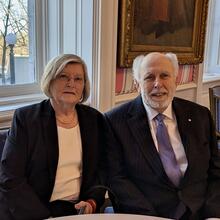Developing and delivering quality healthcare requires an interdisciplinary approach, drawing on fields ranging from history to sociology to communication and design. And Waterloo's strong emphasis on interdisciplinary scholarship is one reason, Dr Peter Warrian and his wife, Dr. Margret Hovenec, established the Lupina Foundation Postdoctoral Research Fellowships with Waterloo's Faculty of Arts.
 Currently a Senior Research Fellow at the Munk Centre for International Studies at the University of Toronto, Warrian jokes that he's "probably the only person with four degrees from the University of Waterloo." He and Hovenec were inspired to create the Waterloo-Arts postdoctoral fellowships because they firmly believe that humanities and social sciences are critical to developing excellent healthcare.
Currently a Senior Research Fellow at the Munk Centre for International Studies at the University of Toronto, Warrian jokes that he's "probably the only person with four degrees from the University of Waterloo." He and Hovenec were inspired to create the Waterloo-Arts postdoctoral fellowships because they firmly believe that humanities and social sciences are critical to developing excellent healthcare.
"We were interested in the social determinants of health, particularly believing that the humanities had a lot to bring to the issue of health-that you couldn't just equate health with medicine. If you're interested in the social determinants of health, that can get you into political issues, economics and sociology, for example."
The Lupina Foundation's Postdoctoral Research Fellowships support broader approaches to health research by funding outstanding early-career researchers addressing human and social wellbeing at the intersection of health, society, and technology.
Two of this year's fellows exemplify the ways in which humanities, social sciences and digital design are critical to improving healthcare for all.
Designing inclusive exercise games to engage seniors
Dr. Reza Hadi Mogavi, a computer science and engineering graduate of the Hong Kong University of Science and Technology, is currently focused on examining user experience design (UX) in video games created to encourage exercise-sometimes called "exergames." Researchers have been exploring the ways exergames can help encourage and improve conditions associated with aging, ranging from Parkinson's to dementia. But not all exergames have been designed with seniors' varied perspectives in mind. Working in Waterloo's Human-Computer Interaction Games Group, Mogavi is studying how seniors from different social and cultural backgrounds might best engage with exergames, and how developers can make their games more accessible and appealing to a wider audience. This fall he'll present his paper on this subject at a prestigious Computer-Human Interaction conference in Finland.
Distinguishing long-term care tasks that will benefit from AI boost
Dr. Krystle Shore, who recently completed her PhD is in sociology and legal studies at Waterloo, is examining the effectiveness of AI-supplemented electronic health record applications developed for Canadian long-term health care providers. These systems promise to generate assessments and health care plans tailored to individual patients. They're marketed as data-driven solutions to persistent problems in long-term care, such as understaffing-problems that will only increase as Canada's population ages. Shore's work takes a critical eye to its promises, examining how front-line workers use the software in practice. The results of Shore's research can help distinguish which healthcare tasks benefit from an AI boost, and which require other solutions-information that can help policymakers as they shape the future of long-term care, designers as they refine electronic records programs, and the broader public as more Canadians enter long-term care.
Since it was founded, the Lupina Foundation has supported over 250 postdocs and research projects at universities across Canada and internationally. Warrian and Hovenec set a general mandate for the fellowships, while university committees award the funds. Past Lupina projects have included an internationally adopted protocol for treating agoraphobia developed at the University of Oxford, a fourteen-year research project into community trauma in Northern Ireland, and bird flu containment methodology development with Anhui University in Heifei, China.
"We're frequently surprised and delighted by the topics that are generated," says Warrian. "And we trust and expect interdisciplinary and creative excellence at Waterloo."
The Faculty of Arts extends heartfelt thanks to Drs. Warrian and Hovenec and the Lupina Foundation for their generous support.
Banner image: AI-generated illustration courtesy of Reza Hadi Mogavi.






